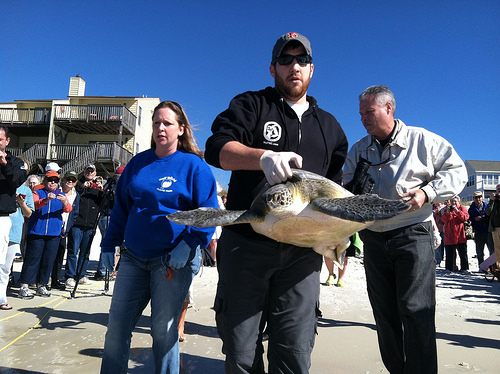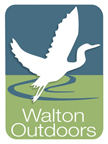
The Florida Fish and Wildlife Conservation Commission (FWC) and several partners returned approximately 50 sea turtles to the wild Jan. 14, 2014 in the Gulf of Mexico off Cape San Blas after the animals were rescued from last week’s cold water temperatures.
“It is very satisfying to be able to release these turtles following the exhaustive effort put in by rescuers last week,” said Dr. Allen Foley, FWC sea turtle biologist. “Our staff, partners and volunteers spent many hours braving cold conditions to search for and rescue these cold-stunned turtles.”
The sea turtles were rescued between Jan. 7 and Jan. 9, when water temperatures dipped below 50 degrees, causing cold-stunning. Cold-stunned turtles may float listlessly in the water or wash ashore, largely unable to move. In this state, they are susceptible to further effects from the weather, and to attacks by gulls that often involve eye injuries. Many of these turtles would die without human intervention.
Most of the turtles were found in St. Joseph Bay, while others were rescued near Crooked Island and in Big Lagoon in Escambia County. The affected sea turtles were mainly green turtles, but a few were Kemp’s ridleys. Both species are endangered. The rescued turtles were all taken to Gulf World Marine Park in Panama City to allow them to recover from exposure to the unusually low water temperatures.
A water-temperature-monitoring buoy in St. Joseph Bay allows biologists to predict when sea turtle cold-stunning may occur. Thanks to this, responders were ready with a plan of action for this event. There is no forecast of cold-stunning conditions returning to the area in the near future.
The turtles were tagged before their release to allow researchers to individually identify them if any are encountered again in the future. Biologists chose to release the turtles into the Gulf at Cape Palms Park on Cape San Blas because the water is warmer and turtles released in the area in the past have returned to St. Joseph Bay, which is a known feeding area.
The public is asked to report any stranded, injured or dead sea turtles to the FWC’s Wildlife Alert Hotline at 888-404-FWCC (3922) or #FWC or *FWC on a cell phone. Florida residents can help support sea turtle research and response efforts by purchasing a sea turtle license plate at BuyaPlate.com or through their local tax collector.
For more information about Florida’s sea turtles, visit MyFWC.com/Research or MyFWC.com/SeaTurtle.
